Reposted with Love & thanks:
Delly Doolittle ♥ Vegan 11:11
Martha
*♥♥*Garden of Vegan*♥♥ *
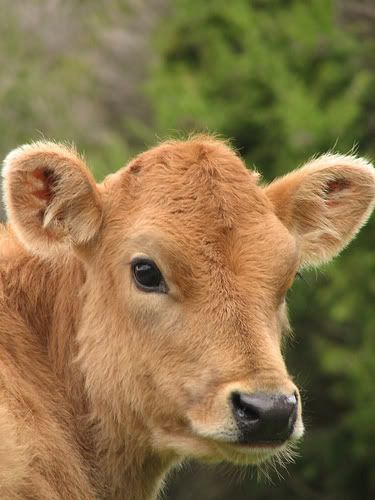
by John Robbins; 1987
Excerpts from Diet for a New America
Is there a doctor in the house?
You might think that your doctor would be a reliable guide to your optimum diet, and would convey to you any emerging truths of sound nutritional research that significantly affect your health - But actually, most doctors don't know very much about nutrition- You'd think they would, but they don't -That's not their department - They have been trained to treat disease with drugs and surgery - They have not been trained to prevent disease through healthy life and diet-styles
Nutritional education is not just inadequate in contemporary medical schools; in most cases it's nonexistent- At the 69th annual meeting of the American Medical Women's Association, one doctor drew knowing laughs when she told the audience about her lack of nutritional training - Said Dr Michelle Harrison:
"They had one lecture -- on a Saturday morning -- and it wasn't compulsory- I don't remember what was in the lecture, because I didn't go"
Only 30 of the nation's 125 medical schools have a single required course in nutrition - A recent Senate investigation revealed that the average physician in the United States received less than three hours of training in nutrition during four years of medical school
Thirty years ago, when many doctors smoked cigarettes themselves, it would have been pretty hard to elicit sound advice from them on the health consequences of smoking - Many doctors, in fact, recommended smoking to non-smokers, as a way of dealing with social nervousness- It wasn't that these doctors were evil people, or lackeys for the tobacco industry- It was, rather, that they hadn't been told anything in medical school about the relationship between smoking and major health problems- They lived in the same culture as everyone else, in which smoking was seen as totally legitimate - In fact, a famous Camel cigarette commercial loudly trumpeted: "More Doctors Smoke Camels Than Any Other Cigarette," and made a point of linking good healthcare with smoking their brand
Today, a similar situation exists with respect to the health consequences of a meat habit- Today's physician is exposed to the same propaganda promoting meat and dairy product consumption as the rest of us, and he hasn't the nutritional training that would enable him to evaluate these messages any more intelligently than we can - Furthermore, the meat, egg, and dairy industries are particularly keen on "educating" doctors with their biased view of nutrition - The Meat Board, for example, has presented a series of extremely expensive full page color ads in the Journal of the American Medical Association, presenting a nutritional slant that one nutritional authority, Dr Kenneth Buckley, did not find at all impressive - He called it:
"slick and deceitful propaganda, coloring and twisting the facts in the most manipulative way"
The Lowest and Highest Life Expectancies in the World
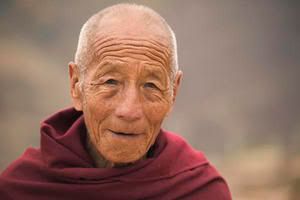
After World War II, scientists began for the first time to compile comprehensive statistics correlating the diet-styles and health of all the populations in the world
One fact that emerged consistently was the strong correlation between heavy flesh-eating and short life expectancy- The Eskimos, the Laplanders, the Greenlanders, and the Russian Kurgi tribes stood out as the populations with the highest animal flesh consumption in the world -- and also as among the populations with the lowest life expectancies, often only about 30 years
It was found, further, that this was not due to the severity of their climates alone - Other peoples, living in harsh conditions, but subsisting with little or no animal flesh, had some of the highest life expectancies in the world- World health statistics found, for example, that an unusually large number of the Russian Caucasians, the Yucatan Indians, the East Indian Todas and the Pakistan Hunzakuts have life expectancies of 90 to 100 years
The United States has the most sophisticated medical technology in the world, and one of the most temperate of climates- One of the highest consumers of meat and animal products in the world, it also has one of the lowest life expectancies of industrialized nations
The cultures with the very longest life spans in the world are the Vilcambas, who reside in the Andes of Ecuador; the Abkhasians, who live on the Black Sea in the USSR; and the Hunzas, who live in the Himalayas of Northern Pakistan- Researchers discovered a "striking similarity" in the diets of these groups, scattered though they are in different parts of the planet- All three are either totally vegetarian or close to it
Particularly striking to researchers who have visited these cultures is that the people not only live so long, but that they enjoy full, active lives through their many years, and show no signs of the many degenerative diseases that afflict the elderly in our culture
"They work and play at 80 and beyond; most of those who reach their 100th birthday continue to be active, and retirement is unheard of - The absence of (excess protein) in their diets engenders slower growth and slim, compact body frames- With age, wisdom accumulates, but physical degeneration is limited so the senior citizens of these remote societies have something unique to contribute to the lives of others - They are revered"
The Lab Results Speak
At Yale, Professor Irving Fisher designed a series of tests to compare the stamina and strength of meat-eaters against that of vegetarians- He selected men from three groups: meat-eating athletes, vegetarian athletes, and vegetarian sedentary subjects - Fisher reported the results of his study in the Yale Medical Journal - His findings do not seem to lend a great deal of credibility to the popular prejudices that hold meat to be a builder of strength
"Of the three groups compared, the... flesh-eaters showed far less endurance than the abstainers (vegetarians), even when the latter were leading a sedentary life"
Overall, the average score of the vegetarians was over double the average score of the meat-eaters, even though half of the vegetarians were sedentary people, while all of the meat-eaters tested were athletes
A comparable study was done by Dr J Ioteyko of the Academie de Medicine of Paris- Dr Ioteyko compared the endurance of vegetarians and meat-eaters from all walks of life in a variety of tests - The vegetarians averaged two to three times more stamina than the meat-eaters- Even more remarkably, they took only one-fifth the time to recover from exhaustion compared to their meat-eating rivals
Wherever and whenever tests of this nature have been done, the results have been similar - Doctors in Belgium systematically compared the number of times vegans and meat-eaters could squeeze a grip-meter - The vegetarians won handily with an average of 69, whilst the meat-eaters averaged only 38 - As in all other studies which have measured muscle recovery time, here, too the vegetarians bounced back from fatigue far more rapidly than did the meat-eaters
World Records

The achievement of vegetarian athletes are particularly noteworthy considering the relatively small percentage of vegetarian entrant - Athletes, after all, are not immune from the cultural conditioning that meat alone gives the required strength and stamina - Yet some have adopted vegetarian diets and the results invite scrutiny
Dave Scott, of Davis, California is universally recognized as the greatest triathlete in the world - He has won Hawaii's legendary Ironman Triathlon a record four times, including three years in a row, while no one else has ever done it more than once - The event consists, in succession, of a 2 point 4-mile ocean swim, a 112-mile cycle, and then a 26 point 2-mile run
Dave calls the idea that people, and especially athletes, need animal protein a "ridiculous fallacy" -There are many people who consider Dave Scott the fittest man who ever lived - Dave Scott is a vegetarian
I don't know how you might determine the world's fittest man - But if it isn't Dave Scott it might well be Sixto Linares - This remarkable fellow tells of the time:
"when I became a vegetarian in high school, my parents were very very upset that I wouldn't eat meat... After fourteen years, they are finally accepting that it's good for me - They know it's not going to kill me "
During the fourteen years that Sixto's parents begrudgingly came to accept that his diet wasn't killing him, they watched their son set the world's record for the longest single-day triathlon, and display his astounding endurance, speed, and strength in benefits for the American Hearth Association, United Way, the Special Children's Charity, the Leukemia Society of America, and the Muscular Dystrophy Association - So deeply ingrained, however, is the prejudice against veganism that even as their son was showing himself possibly to be the fittest human being alive, his parents only reluctantly came to accept his diet - Sixto says he experimented for awhile with a lacto-ovo vegetarian diet (no meat, but some dairy products and eggs), but now eats no eggs or dairy products and feels better for it
It doesn't seem to be weakening him too much - In June 1985, at a benefit for the Muscular Dystrophy Association, Sixto broke the world record for the one-day triathlon by swimming 4 point 8 miles, cycling 185 miles, and then running 52 point 4 miles
Then there's Edwin Moses - No man in sports history has ever dominated an event as Edwin Moses has dominated the 400-meter hurdles - The Olympic Gold Medalist went eight years without losing a race, and when Sports Illustrated gave him their 1984 "Sportsman of the Year" award, the magazine said, "No athlete in any sport is so respected by his peers as Moses is in track and field"- Edwin Moses is a vegetarian
Paavo Nurmi, the "Flying Finn," set twenty world records in distance running, and won nine Olympic medals- He was a vegetarian
Bill Pickering of Great Britain set the world record for swimming the English Channel, but that performance of his pales beside the fact that at the age of 48 he set a new world record for swimming the Bristol Channel - Bill Pickering is a vegetarian
Murray Rose was only 17 when he won three gold medals in the 1956 Olympic Games in Melbourne, Australia - Four years later, at the 1960 Olympiad, he became the first man in history to retain his 400 meter freestyle title, and he later broke both his 400 meter and 1500 meter freestyle world records - Considered by many to be the greatest swimmer of all time, Rose has been a vegetarian since he was two
You might not expect to find a vegetarian in world championship body-building competitions -But Andreas Cahling, the Swedish body builder who won the 1980 Mr International title, is a vegetarian, as has been for over ten years of highest level international competition - One magazine reported that Cahling's "showings at the Mr Universe competitions, and at the professional body-building world championships, give insiders the feeling he may be the next Arnold Schwarzenegger "
Another fellow who is not exactly a weakling is Stan Price - He holds the world record for the bench press in his weight class - Stan Price is a vegan - Roy Hilligan is another gentleman in whose face you probably wouldn't want to kick sand - Among his many titles is the coveted Mr America crown - Roy Hilligan is a vegetarian
The Rise and Fall of the Protein Empire
Not all authorities agree on a precise figure for our daily needs of protein, but their calculations do fall within a specific range - It is a range that runs from a low estimate of two and a half percent of our total daily calories up to a high estimate of over eight percent
The figures at the high end end include built-in safety margins, and are not "minimum" allowances, but rather "recommended" allowances
If we ate nothing but wheat (which is 17% protein), or oatmeal (15%), or pumpkin (15%0, we could easily have more than enough protein - If we ate nothing but cabbage (22%), we'd have over double the maximum we might need
In fact, if we ate nothing but the lowly potato (11% protein) we would still be getting enough protein
This fact does not mean potatoes are a particularly high protein source - They are not - Almost all plant foods provide more - What it does show, however, is just how low our protein needs really are
There have been occasions in which people have been forced to satisfy their entire nutritional needs with potatoes and water alone - Individuals who have lived for lengthy periods of time under those conditions showed no signs whatsoever of protein deficiency, though other vitamin deficiencies have occurred
Arnold Schwarzenegger, the virtual symbol of male muscular development, says in his book, Arnold's Body Building for Men:
"Kids nowadays...tend to go overboard when they discover body building and eat diets consisting of 50 to 70% protein--something I believe to be totally unnecessary... (In) my formula for basic good eating: eat about one gram of protein for every two pounds of body weight "
This formula is in keeping with the range we have already discovered
To meet Arnold Schwarzenegger's suggested protein quota, you'd do fine without meat, eggs, or dairy products - If you ate only broccoli, I'd probably wonder whether you had lost your marbles, but you'd get more than four times Schwarzenegger's suggested requirement
Osteoporosis and the Protein Connection
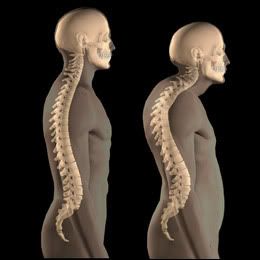
Unfortunately, the loss of calcium and other minerals from the bones is a gradual process which goes on steadily for a long time before it becomes evident - There is no flashing red light to warn us that our bodies are losing calcium - And it is usually not apparent until loose teeth, receding gums, or a fractured hip show how brittle and chalky the bones have become - The end result of the skeletal structure's gradual erosion is calcium-deficient bones that may break with the slightest provocation - Even a mere sneeze may crack a rib
One of the reasons the decreasing bone density is hard to detect until it reaches such an unfortunate stage is that even in extreme cases of osteoporosis, the calcium level of the blood is usually normal - In the body's ranking of needs, the blood level of calcium takes definite priority over the bone level of calcium - The body needs calcium in the blood for vital operations, such as controlling muscular contractions, including the heart, blood clotting, transmission of nerve impulses, and other utterly essential tasks - When the body needs to supply calcium to the blood for any reason, it acts as if the bones were a "bank" of stored calcium, and through a series of biochemical reactions a "check" is drawn on the calcium bank - Your body draws calcium from your bones to supply calcium to your blood
I used to believe that bones lost calcium only if there were not enough calcium in our diets - The National Dairy Council is the foremost spokesman for this point of view, and the solution they propose, not at all that surprisingly, is for us all to drink more milk and eat more dairy products - This point of view does seem logical - But modern nutritional research clearly indicates a major flaw in this perspective - Osteoporosis is, in fact, a disease caused by a number of things, the most important of which is excess dietary protein!
The correspondence between excess protein intake and bone resorption is direct and consistent - Even with very high calcium intakes, the more excess protein in the diet the greater the incidence of negative calcium balance, and the greater the loss of calcium from the bones - In other words, the more protein in our diet, the more calcium we lose, regardless of how much calcium we take in
Summarizing the medical research on osteoporosis, one of the nation's leading medical authorities on dietary associations with disease, Dr John McDougall, says:
"I would like to emphasize that the calcium-losing effect of protein on the human body is not an area of controversy in scientific circles - The many studies performed during the past fifty-five years consistently show that the most important dietary change that we can make if we want to create a positive calcium balance that will keep our bones solid is to decrease the amount of proteins we eat each day - The important change is not to increase the amount of calcium we take in"
Losing a War We Could Prevent
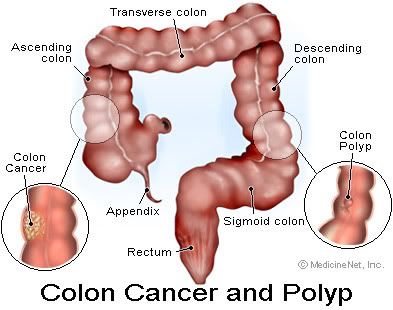
In 1971, President Nixon signed the Conquest of Cancer Act, thereby officially inaugurating what has become known as the "War on Cancer " - Today, the war continues - Every day the National Cancer Institute spends over three million dollars - They are joined in the fray by organizations such as the American Cancer society, which spend another million dollars a day
You might think that with so much money being spent, we'd be making progress - But the war on cancer isn't going very well - We aren't massacring the enemy; it's massacring us
"Everyone should know the war on cancer is largely a fraud "
-- Dr Linus Pauling, two-time Nobel prize winner
The most common caners -- cancers of the lung, colon, breast, prostate, pancreas, and ovary -- together account for most cancer deaths- the death rate from these cancers has either stayed the same, or increased, during the past 50 years- And the statistics for the less common cancers are equally bleak
John Bailar, former editor of the Journal of the National Cancer Institute, who worked for the Institute for 25 years, told the 1985 annual meeting of the American Association for the Advancement of Science that today more people with benign or mild diseases are being included in the statistics, in order to make it seem like more cancer victims are being cured
Another tactic, which makes it appear things are getting better than they are, is to define a cancer patient as "cured" if he or she has survived for five years after being diagnosed, and is free of obvious symptoms - With early enough detection, many cancer victims will indeed fit this criteria of "cured"- However, in many cases, this early detection does not change the date of death, but only the length of time the person is aware he or she has cancer- One prominent physician who has seen more than enough of modern cancer treatment has grown very cynical:
"The real beneficiaries of early detection are the providers of health care, who now have a longer time in which to treat the victims before they die- This means they can charge more for doctor's visits, more procedures, more tests, and longer hospital stays -The American Cancer Society ... has put hope up for sale- Unfortunately to date, it has been selling mostly false hope" -- Dr John McDougall
Two Searches
In 1976, the United States Senate Select Committee on Nutrition and Human Needs, under the chairmanship of Senator McGovern, convened public hearings on the health effects of the modern American diet - After listening to the testimony of the nation's leading cancer experts, McGovern was not particularly delighted with the war on cancer, calling it a "multi-billion dollar medical failure "
At one point in the proceedings, McGovern pointedly asked National Cancer Institute director Arthur Upton how many cancers are caused by diet- The head of the largest cancer organization in the world replied "up to 50 percent "
McGovern was dumbfounded - "How can you assert the vital relationship between diet and cancer," he demanded, "and then submit a preliminary budget that only allocates a little more than one percent (of National Cancer Institute funds) to this problem?" Dr Upton responded sheepishly: "That question is one which I am indeed concerned about myself "
Organizations like the National Cancer Institute are not encouraged to focus much attention on prevention because there is vastly more money to be made in treatment, and far more glamour in the possibility, however remote, of a cure- Attention is further drawn away from prevention by food industries whose products are known to be involved - They apply immense pressure on government and public health organizations to keep them from informing the public as to what is known about dietary prevention - The result is that you and I are continually being told to put our faith and our money into cancer treatment, and into the hope for an eventual cure - We are not told how to keep cancer from happening in the first place- The tragic result is that we are losing a war we could prevent
Colon Cancer
In the 1970's, a number of studies were published in the Journal of the National Cancer Institute which reported what was then startling news- Researchers were finding that the incidence of colon cancer was high in precisely those regions where meat consumption was high, and low where meat consumption was low
It was found, in fact, that there is not a single population in the world with a high meat intake which does not have a high rate of colon cancer- Even the conservative journal of the Association for the Advancement of Science concluded:
"Populations on a high-meat, high-fat diet are more likely to develop colon cancer than individuals on vegan or similar low-meat diets"
The digestion of meat itself produces strong carcinogenic substances in the colon and meat-eaters must produce extensive bile acids in their intestines to deal with the meat they eat, particularly deoxycholic acid- This is extremely significant, because deoxycholic acid is converted by clostridia bacteria in our intestines into powerful carcinogens- The fact that meat-eaters invariably have far more deoxycholic acid in their intestines than do vegetarians is one of the reasons they have so much higher rates of colon cancer
The human intestine has a very hard time handling the putrefying bacteria, high levels of fat, and lack of fiber that characterize meat, dairy products, and eggs- There are other animals, though, whose intestines seem designed for the task- The human intestine is anatomically very different from that of the natural carnivores, such as dogs and cats- Because of the design of their intestines, these animals are virtually guaranteed short transit times
Our bowel walls are deeply puckered; theirs are smooth - Ours are full of pouches, theirs have none - Our colons are long, complex pathways, like a winding mountain road full of hairpin turns; theirs are short, straight chutes, like wide open freeways - The toxins from putrefying flesh are not the problem for them that they are for us because everything passes through them so much more quickly - Dogs, cats, and the other natural carnivores do not get colon cancer from high-fat, low-fiber, flesh-based diets - But we do
Reducing your intake of pesticides
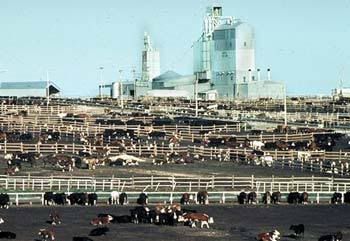
The most effective way to reduce your intake of toxic chemicals is to eliminate your intake of meats, fish, dairy products and eggs
Some people feel that eating "organically raised" beef and poultry is a good way to limit their intake of pesticides - It is important to realize, though, that while meat products labeled "natural" or "organic" may be better than the typical factor farm commercial products, they still will include the concentrated toxins from all the foods the livestock ate - These lethal chemicals accumulate in the fatty tissues of animals in much greater concentrations than are found in fruits and vegetables - Pesticide authority Lewis Regenstein writes:
"Meat contains approximately 14 times more pesticides than do plant foods; dairy products point 5 times more - Thus, by eating foods of animal origin, one ingests greatly concentrated amounts of hazardous chemicals - Analysis of various foods by the FDA shows that meat, poultry, fish, cheese and other dairy products contain levels of these pesticides more often and in greater amount than other foods"
Contaminated mother's milk

In 1976, the EPA analyzed the breast milk of vegetarian women, and discovered the levels of pesticides in their milk to be far less than the average - A study published in the New England Journal of Medicine made a similar comparison, and found:
"The highest levels of contamination in the breast milk of the vegetarians, was lower than the lowest level of contamination (in) non-vegetarian women ... The mean vegetarian levels were only one or two percent as high as the average levels in the United States"
This is a tremendously important statistic - The breast milk of the average vegan nursing mother in the United States contains only one or two percent of the pesticide contamination as that experienced in the national average
Wasting the food we have

The livestock population of the United States today consumes enough grain and soybeans to feed over five times the entire human population of the country- We feed these animals over 80% of the corn we grow, and over 95% of the oats
It is hard to grasp how immensely wasteful is a meat-oriented diet-style - By cycling our grain through livestock, we end up with only 10% as many calories available to feed human mouths as would be available if we ate the grain directly
To supply one person with a meat habit food for a year requires three-and-a-quarter acres - To supply one lacto-ovo vegetarian with food for a year requires one-half acre- To supply one pure vegetarian [vegan] requires only one-sixth of an acre - In other words, a given acreage can feed twenty times as many people eating a pure vegetarian diet-style as it could people eating the standard American diet-style
According to the Department of Agriculture statistics, one acre of land can grow 20,000 pounds of potatoes - That same acre of land, if used to grow cattle feed, can produce less than 165 pounds of beef - In a world in which a child dies of starvation every two seconds, an agricultural system designed to feed our meat habit is a blasphemy
The ground beneath our feet
The U S Soil Conservation Service reports that over 4 million acres of cropland are being lost to erosion in this country every year- That's an area the size of Connecticut - Our annual topsoil loss amounts to 7,000,000,000 tons - That is 60,000 pounds for each member of the population
Of this staggering topsoil loss, 85 percent is directly associated with livestock grazing
Timber!
The United States has converted approximately 260 million acres of forest into land which is now needed to produce the wasteful diet-style most Americans take for granted- Since 1967, the rate of deforestation in this country has been one acre every five seconds
But the primary cause of deforestation is not urban development - For each acre of American forest that is cleared to make room for parking lots, roads, houses, shopping centers, etc , seven acres of forest are converted into land for grazing livestock and/or growing livestock feed
The fountain of life
Over half the total amount of water consumed in the United States goes to irrigate land growing feed and fodder for livestock - Enormous additional quantities of water must also be used to wash away the animals' excrement - It would be hard to design a less water-efficient diet-style than the one we have come to think of as normal
To produce a single pound of meat takes an average of 2,500 gallons of water -- as much as a typical family uses for all its combined household purposes in a month
To produce a day's food for one meat-eater takes over 4,000 gallons; for a lacto-ovo vegetarian, only 1,200 gallons; for a pure vegetarian, only 300 gallons - It takes less water to produce a year's food for a pure vegetarian(vegan) than to produce a month's food for a meat-eater
ECO-EATING
Global Warming due to Animal Agriculture
______________________________________________

_______________________________________________________


2 comments:
Hey i am fresh here, I stumbled upon this message board I have found It positively accommodating and its helped me out alot. I hope to contribute and support other people like its helped me.
Thanks Everyone, See You About.
Hello i'm fresh here, I hit upon this board I have found It truly accessible & it has helped me out loads. I hope to give something back and help others like its helped me.
Thanks Everyone, Catch You Around.
Post a Comment